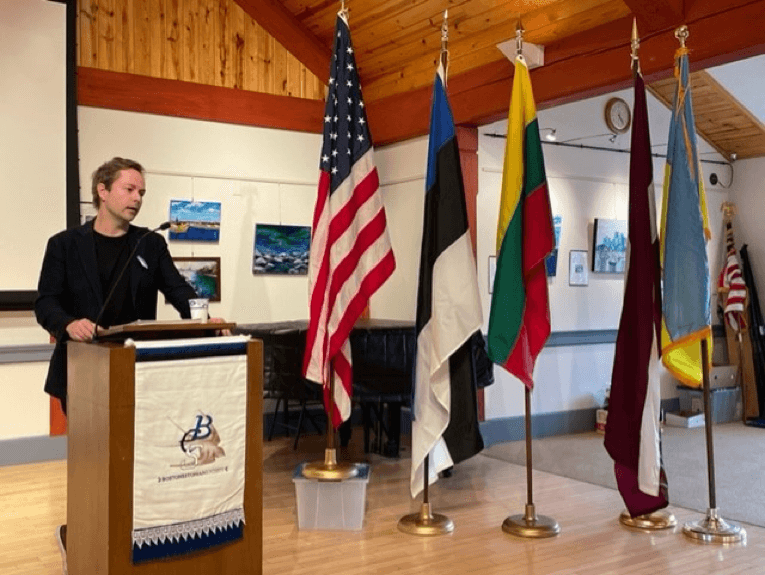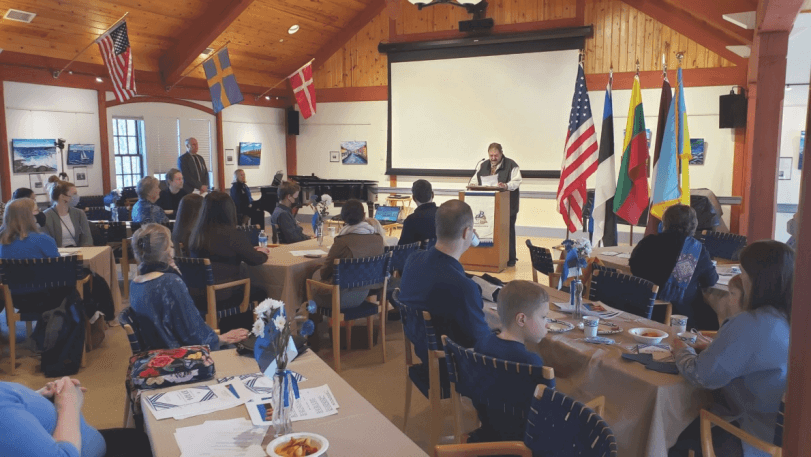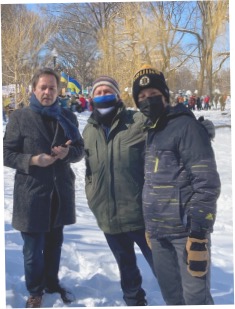On Sunday morning, February 27th, as “The Bog”/ “Soo”, a film based on the novel by Estonian author Oskar Luts, premiered on the big screen in downtown Boston, thousands of Ukrainian supporters were congregating at the nearby Boston Public Gardens to protest Russia’s invasion of Ukraine.
After the screening of the film, the Estonians film goers joined a group of Latvians and together, carrying flags, they hooked up with the multitudes waving fiery placards and blue-yellow flags.

From the Ukrainian rally, the Estonian group proceeded to the Scandinavian Center for the formal celebration of Estonian Independence Day-/Vabariigi Aastapäeva aktus. Even though Covid restrictions were still in effect, Nordic Hall was filled with people gathered around clusters of decorated small tables. Flanking the podium was a Ukrainian flag next to a display of the American flag with the traditional triad of Baltic flags.
Paul Attemann, Boston Estonian Society’s President, presided over the traditional program which held several surprises, such as the Ukrainian guest Vselovod Petriv, President of the Ukrainian Congress Committee of America Boston. His passionate speech closed with a poem “Calamity Again” written in 1859 by Ukraine’s most prominent poet Taras Shevchenko and recently quoted by Anne Applebaum in “The Atlantic”. Epp Sonin followed the speech with an emotional piano rendition of the Ukrainian national anthem.
The audience viewed a pre-recorded speech by Estonian President Alar Karis honoring the 104th anniversary of Estonia, and telling the Estonian people, “This is not a war of the Russian people. This is President Putin’s war.”
Anne-Reet Annunziata, the Honorary Consul of Estonia of Massachusetts and Rhode Island and member of the Boston Baltic Film Festival Committee, introduced the featured speaker, Olle Mirme, a noted filmmaker from Tallinn who had been invited by the film committee to participate in this year’s festival. Mr. Mirme was the scriptwriter for the “Dawn of War”/”O2”, the Estonian spy thriller set in 1939, that had opened the film festival on Friday evening. He was on hand at the theater for Q&A after the screening and then on Saturday for a panel discussion with other filmmakers from Latvia and Lithuania. (“O2” stands for “Osakond 2,” Estonia’s Secret Intelligence Service.)
Mr. Mirme spoke about the film industry in Estonia and the historical background and the circumstances surrounding the filming of “O2”. He said, “We were advised by several intelligence experts and historians when writing the “O2” scenario. One of the consultants was also former Prime Minister Mart Laar, who is a historian by profession. It was Mr. Laar who told Margus Paju, the film director of “O2”, about the Estonian intelligence officer, who helped the Finns decipher the secret radio code of the Red Army. This played a part in Finland’s ability to resist Russian invasion in the Winter War. The name of the spy was Olev Õun (born in 1903 in Tallinn and died in Sweden in 1951). He became the prototype of Feliks Kangur, the protagonist of “O2”, although in the film he is not a radio scout, but a captain of Estonian military intelligence.”
Mr. Mirme explained how the film is based on facts: the story of how the Molotov-Ribbentrop Pact, a secret agreement signed on August 23, 1939, between Soviet Russia and Nazi Germany, “quickly led to a situation where Estonia was forced to submit to Stalin’s ultimatum and allow Red Army bases onto our territory. In the film, we briefly touch on the simultaneous attack on Poland, which was then crushed by the ‘brothers in arms’ of Germany and the Soviet Union at the same time. The fact that Poland, considered our great and powerful ally, was defeated in less than a month, had a terrible effect on Estonian leaders, led by President Konstantin Päts and General Johan Laidoner. It was understood that we were hopelessly alone and in the event of an attack by the Red Army, no one would come to Estonia’s aid.”
Epp Sonin, who has been the mainstay of all Estonian events in Boston with her musical talent, spirit and energy, sang several Estonian folk songs, and accompanying the audience on the piano, guided them in singing traditional songs, including the anthems.
Although not all of the children from the Boston Estonian School were present, their virtual presence was one of the main highlights of the afternoon. A montage video of the students singing “Eesti lipp” individually or with a sibling, was displayed on a big screen. Triin Vallaste, the school’s director, had created the magic behind the scenes. Enrik Attemann, a young second generation Estonian-American, recited the poem, “Mis värvi on kodu” by Olivia Saar, in perfect Estonian. A sumptuous smorgasbord awaited all the guests.
Marilem Soodla Ferentinos
Key note speaker, Olle Mirme, at the Boston Estonian Society’s annual Independence Day Celebration. (photo: Paul Branzetti)
Honored Ukrainian guest Vsevolod Petriv, President of Ukrainian Congress Committee of America Boston, shares words of solidarity with guests. (photo: Paul Branzetti)

















